Killer Coke Update | May 14, 2007
Coke's Problems & Losses Continue to Escalate
Content of Newsletter
- College Updates
- Simon's Rock College dumps Coke
- Smith College Committee votes not to renew its contract with Coke
- Earlham College
- Ohio State University
- SUNY Albany
- SUNY Stony Brook
- University of Chicago
- University of North Carolina
- University of Michigan
- University of Vermont
- University of Minnesota
- Chabot College, College of Wooster, Florida International University, Pitzer College, Plymouth State University, University of Minnesota, Williams College
- Dave Hancock, NYU, to be union organizer in California
- Labor Updates
- Report on 2007 Coke Shareholders Meeting
- White Plains, New York, Beverage Wholesaler Calls for Boycott of Coke products
- New Videos
- Someone Should Tell Sen. Hillary Clinton to Stop Promoting Coke's Dasani Water
- Literary Magazine in Spain Highlights Killer Coke Campaign
- Major reports from the campaign that are useful in organizing
- Do you need a customized Campaign leaflet?
- Campaign's 'Student Activism' Section
- Take Actions Against Coke!
- Please send photos, reports of events, etc. for the Campaign
a. Simon's Rock College, Massachusetts, Dumps Coke
The Llama Ledger (Simon's Rock College), "Coca-Cola contracts to be terminated: Company attempts to keep contracts," By Timothy Cama, May 7, 2007
Read Article
" 'This is a terrific job by the students,' [Campaign Director Ray] Rogers says of Simon's Rock's campaign. Rogers was pleased that Simon's Rock's administration was so supportive of the student-led campaign, in contrast to administrations at many other schools who have attempted such campaigns.'
b. Here is an April email from a Simon's Rock student:
"I am writing as a student and member of the Activist Collective at Simon's Rock College of Bard in Great Barrington, MA. We started a campaign to get Coca-Cola off campus in November, putting up posters to educate people about Coke's human rights violations and environmental degradation, and starting a petition with signatures from faculty, staff, and students to remove Coke vending machines from dorms, a Minute Maid dispenser in the dining hall, and Coke being sold in the Bookstore.
"This semester, we stepped up the campaign and got the endorsement of Community Council and Academic Senate, a body of all the faculty and some administrators, as well as the signatures of about half the people on campus, and the Administration heard us. This summer, Simon's Rock College is going Coke-free!"
An earlier report in December from Simon's Rock stated:
"The Activist Collective continued their campaign to remove Coke from the campus, and they seek alternatives for Simon's Rock to support a more local company and disassociate the school from a corporation which they say has a history of human rights and environmental violations. Nearly 200 hundred colleges across the U.S. and globally are also working to remove or have already removed Coke from their campuses."
From "Simon Says: News & Views from Simon's Rock College," December 4, 2006
Smith College's Soft Drink Advisory Committee votes 7-2 not to renew contract with Coke
Campaign to Stop Killer Coke Director Ray Rogers visited Smith College in Massachusetts on April 26th for the second time in support of student efforts to kick Coke off campus. That evening, he addressed a gathering of students, faculty and administrators. The next day, Ray met with Smith's nine-member Soft Drink Advisory Committee to respond to their inquiries. The committee then spoke with Coca-Cola's Ed Potter and Pablo LaGacha by speakerphone before voting against Coke.For three years, Smith students have waged an effective campaign that has won the admiration and support of students, faculty and administrators. Hats off to all those students for a job well done.
Smith Coke off Campus, "Smith Committee Votes 7-2 to Exclude Coca-Cola From Beverage Contract Bidding Process; School Awaits Decision by Senior Staff""On Friday, April 27th, Smith College's Soft Drink Advisory Committee voted 7-2 to recommend that Smith not renew its exclusive 7-year contract with Coca-Cola Inc. and ban Coca-Cola from the soft drink bidding process. The recommendation has been forwarded to the Senior Staff, who have pledged to reach a final decision within 30 days."
Read Press Release
Campaigners at Earlham College (Indiana) reported that:
"On April 27, students from Earlham's Campaign to Kick Coke attended the Vendor Relations Committee's meeting to discuss the Coca-Cola issue. The VRC plans to send a letter to Coca-Cola informing them that Earlham is considering banning their products, with further actions to be considered after Coke responds. While it's good to have the ball rolling in any direction, this is obviously a much weaker action than Earlham Progressive Union (EPU) had hoped for.
"The most frustrating aspect of the meeting was being told by two members of the Committee, Dick Smith (VP of financial affairs) and Mark Lautzenheiser (Economics professor), that any campaign waged against Coca-Cola (including the 510-signature petition and support of the local Coca-Cola workers' union) is "irrelevant" to the VRC's decision because, as a committee, it's their job to follow their rules and not to consider outside political action. This might not be so infuriating if the Campus Services branch of the administration had not encouraged us to start a petition in the first place, in order for our concerns about Coke to be "taken seriously." Now EPU has been told that the petition won't be considered. Dick Smith implied that we (the Kick Coke Campaign) should have known about the VRC because "it's on the website" and because EPU had a hand in creating it (well before any of us working on this campaign came to Earlham). Considering that the Committee hasn't met in more than two years and that Campus Services didn't even know about it, I don't think it's so surprising that we didn't. The VRC plans to work by email this summer to draft a letter to Coke and to consider further action."
As Earlham students are preparing to carry the struggle forward, students and a number of faculty members are wondering when administrators at the Quaker School of 1,248 students and 108 faculty will show the kind of leadership expected of them to help prevent further violence and protect human rights.
Below is a link to an online petition that is circulating at the college:
Hold Coke Responsible at Earlham:
Read Petition
Just as shipments of campaign posters, stickers and fliers requested by students at Ohio State University were arriving, a prominent cover story accompanied by a graphic asking: "Is OSU Taking Blood Money?" appeared in the May 9th edition of UWeekly which has a circulation of 51,000 around Ohio State and the local community. The story in turn has helped galvanize others to join forces to wage a high visibility campaign at OSU. According to the article, since 1998, the university "has operated under a $30 million, decade-long 'exclusivity contract' with Coca-Cola." Watch for big headaches for Coke to develop at Ohio State.
UWeekly (Ohio State University), "Killer Coke: Student to spill Coke secrets on university senate," By Jocelyn Beach Sexton, May 9, 2007
Read Article
" 'I first heard about [Coke's business practices] when my brother studied abroad in Colombia,' [Chris] Trout said. 'He spoke to a Coke employee there who was part of a union. One of his family members was kidnapped because of this [union participation], and he was forced to leave the union, or else. This happens all the time down there.' "
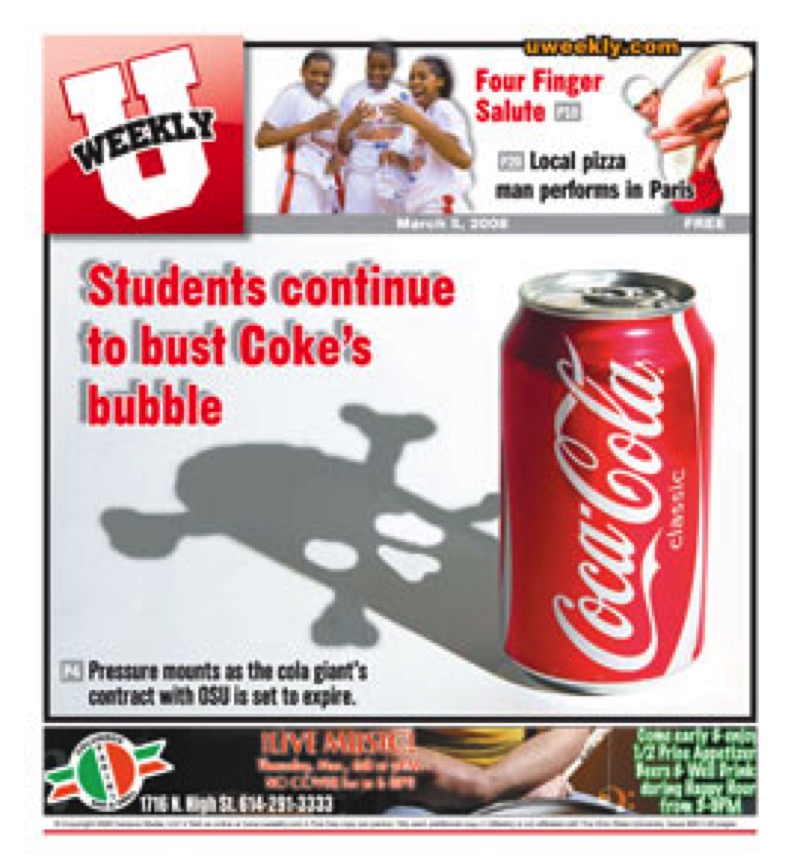
SUNY Albany Demands an End to Coke Contract
"On Tuesday May 1, 2007 Students for Workers' Rights held a Press Conference demanding the University sever their contract with The Coca-Cola Company after announcing that over 1,200 students supported a contract severance. Members of Students for Workers' Rights, including Bessam Sinan, Jackie Hayes and Sean Kite, read statements condemning Coca-Cola for its deplorable actions abroad and calling on UAlbany to sever all ties with such a disreputable corporation. Jim Collins, Anthropology Professor and member of United University Professions (UUP) read the anti-Coke resolution passed at the UUP's statewide Solidarity Committee meeting on April 20, 2007. The resolution called for all UUP chapters to, "press for the termination of contracts with Coca-Cola on their campuses." [This resolution was later passed by the UUP's Delegate Assembly, the union's top policymaking body.]
Following the Press Conference, students marched to the office of Susan Herbst, the Provost and current Officer in Charge, to deliver an anti-Coke petition signed by over 1,200 students along with a list of demands. Susan Hebst received the petition and demands, but refused to comment on her position.
Press Release: Students Demand Ualbany Sever Their Contract With The Coca-Cola Company
Read Press Release
Letter to Provost-In-Charge Susan Herbst
Read Letter
Stony Brook's ten-year exclusive contract with Coca-Cola is coming up for renewal, but a growing student movement on the campus of 25,000 students and faculty, is determined to end the campus's relationship with Coke. On May 9th, five student leaders in the campaign were ready to meet with a large group from the administration and six representatives from Coca-Cola. The students asked Campaign to Stop Killer Coke Director Ray Rogers to attend in the event that Coke raised issues that they needed advice on in order to respond.
When Ray arrived at the administration building, he was brought into a room in which Karol Gray, Vice President of Administration and Finance and chair of the meeting, was waiting with the students who would attend. Ms. Gray had obviously had been misled by Coke representatives who had apparently pressured and convinced her that Ray should not be allowed to speak at all. So Ray was informed that he could attend, but not speak.
Confident that the students were well-prepared, Ray agreed to the format, but said he felt he should receive the same opportunity to meet with key administrators as they provided for Coke. Ms. Gray first disagreed, but after Ray and the students said that they had a problem with that, she agreed that Ray would get a meeting. The students did an excellent job dealing with the six representatives from Coca-Cola and its largest bottler, Coca-Cola Enterprises.
After the meeting, Ms. Gray asked Ray if he could come back later in the afternoon to meet with a group of administrators. That meeting took place. Ms. Gray, who recently became the new VP of Administration and Finance, made it clear when she told Ray that SUNY Stony Brook would not do business with an unethical business partner.
The Stony Brook Statesman, "SJA Gains Momentum Against Coke: Student Voices Heard, By Adam Peck, April 23, 2007
Read Article
The Stony Brook Statesman, "Killer Coke Campaign Looks to Expiring Contract in 2008, By Adam Peck, March 5, 2007
Read Article
University of Chicago prepares to make decision whether to dump Coke Student government leaders at the University of Chicago invited Campaign to Stop Killer Coke Director Ray Rogers to go head-to-head with Coca-Cola representatives on May 22 in an open forum before a decision would be made whether to dump Coke from the University. Ray wholeheartedly accepted the challenge, but Coca-Cola, as usual, refused to enter into any kind of debate. A format will be established with Ray addressing what is expected to be a packed audience and responding to questions. The Coca-Cola representatives will then have the opportunity to speak to the same audience. We hope there is as large a turnout as possible.
Students at the University of Chicago have done a remarkable job mobilizing the student body to demand that Coke be held accountable by the University.
Chicago Maroon (University of Chicago), "Coke's future on campus hinges on vote," By Mimi Yang, May 11, 2007
Read Article
"By the end of spring quarter, students will know whether University-run dining and food facilities will continue to provide Coca-Cola brand products in the upcoming year. Both Coca-Cola supporters and members of the Campaign to Kick Coke Off Campus anxiously await the decision that will be the culmination of two contentious years of student activism."
Chicago Maroon (University of Chicago), "With Coca-Cola, capitalism's injustices are abundantly clear," By Daniel Benjamin, May 11, 2007
Read Article
"McCarl's claims that the campus campaign selected Coca-Cola 'arbitrarily' and that Coke's human-rights abuses are 'alleged' are in every way specious. Our actions respond to the Colombian workers' call for an international boycott, a call answered by over 30 colleges, including DePaul, NYU, and Swarthmore. While Coca-Cola is not the only corporation with deplorable human rights practices, it is one of the worst and is the leader in the soft drinks industry. Change in Coke's behavior makes change by Pepsi and others far likelier."
"While surely no one on the anti-Coke campaign claims to stand outside the benefits of capitalism, we try to be aware, and to make others aware, that there are many injustices in the free-market system. And so, through our purchasing power, we try to help workers worldwide to exercise the freedoms that McCarl values so highly."
h. University of North Carolina
The Daily Tar Heel, the newspaper of the University of North Carolina, ran a three-part series on Killer Coke.
The Daily Tar Heel, "Murder in Colombia: the real thing?" By: Clint Johnson, April 10, 2007
Read Article
The Daily Tar Heel, " Coke faces world of critics" By: Clint Johnson, April 11, 2007
Read Article
The Daily Tar Heel (University of North Carolina), "Activists engage in cola war," By Clint Johnson, April 12, 2007
Read Article
University of Michigan Notes ILO is not up-to-date on its "investigation."
The University of Michigan ended its relationship with The Coca-Cola Co. in December 2005 after a hard-fought campaign involving more than 20 campus organizations in coalition. However, in April 2006, one man — Tim Slottow, Executive Vice President and CFO of the University of Michigan - decided to resume sales of Coke after Coke announced that the International Labor Organization of the United Nations had agreed to do an "investigation" of Coke's past and present labor practices in Colombia and The Energy and Resources Institute (TERI) was developing an "impartial independent third party assessment of water resource management practices at Coca-Cola facilities in India..."
The Campaign pointed out that the ILO's Sally Paxton stated that the ILO would only do an "assessment of current working conditions," not of past labor relations practices. She also insisted that the ILO was not going to conduct "an investigation," adding that there won't even be an "assessment" of the parent company, Coca-Cola. High-level ILO officials confirmed Ms. Paxton's interpretation in December 2006 and January 2007.
In fact, Coke spokesperson, Ms. Kirsten Whit, contradicted Coke executives in the April 10th article below in The Michigan Daily: "The ILO presence in Colombia is not specifically for the Coca-Cola Company, but to monitor all corporations."
The Michigan Daily further reported: "When Coke products were brought back to campus in April of 2006, the Dispute Review Board set a deadline for assessments of the conditions in both countries to be completed by March 31, 2007 and be reported to the University by April 30. By May 31, Coke is required to have a plan of action in place. So far, the investigations have missed the March deadline."
" 'It's really a comedy of sorts if you look at it,' Rogers said. 'The ILO investigation and their office in Colombia [for its purported investigation] doesn't exist now and won't ever exist.' Rogers, like many involved with the issue, is especially concerned about the ties between Potter and the ILO, because of Potter's involvement in both the ILO and the Coca-Cola Company. 'The ILO cannot be considered unbiased because of their relationship with Ed Potter,' he said."
The Michigan Daily, "Coke investigations behind schedule: Inquiries into alleged violations were slated to end in May," By Emily Angell, April 10, 2007
Read Article
The Campaign also raised the question — how could the University of Michigan be duped into believing that TERI could develop an impartial independent third party assessment? Consider the facts:
- Coca-Cola India Ltd. is listed by TERI on its website as a corporate sponsor;
- TERI Governing Council member Deepak S. Parekh is on the Advisory Board of Coca-Cola India;
- At least two current projects of TERI are sponsored by Coca-Cola India Ltd.
Read the Campaign's "University of Michigan Falls Prey to Another Coca-Cola PR Scam," April 17, 2006
University of Vermont's Coca-Cola Olympics
Email from Justin Hurtt:
Hello everyone! This past weekend, the University of Vermont held Earthfest in celebration of Earth Week and as a tribute to Michelle Gardner-Quinn, a student who was murdered this past fall in Burlington. Coalition for Responsible Coca-Cola was out in full swing with its Coca-Cola Olympics to highlight the unethical and environmental destructive acts Coca-Cola commits in Columbia and India.
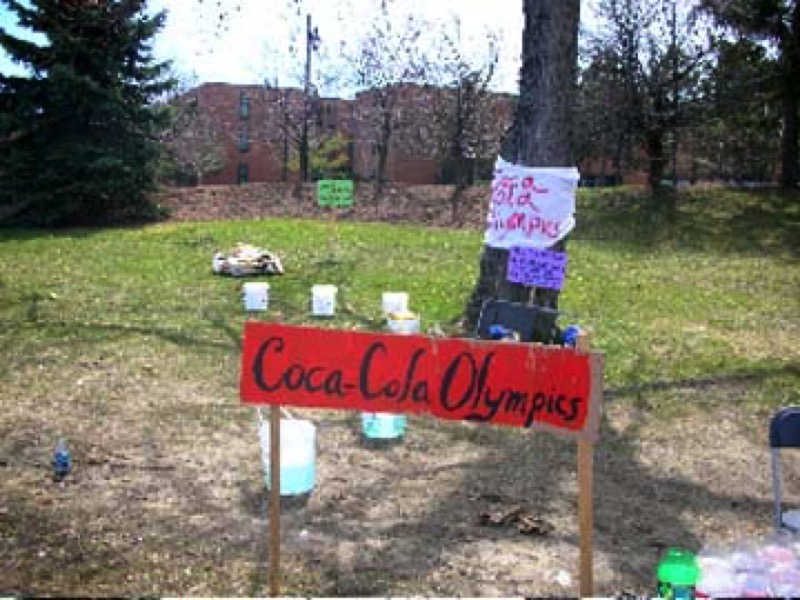
These crimes were transformed into carnival activities for people to participate in and learn about Coke's misdeeds! These included:
Steal Groundwater from Indian Villagers Sponge Race which had participants fill a sponge with water from the Indian villagers' well and race across to fill a Dasani bottle with the winner being the first to fill their bottle.
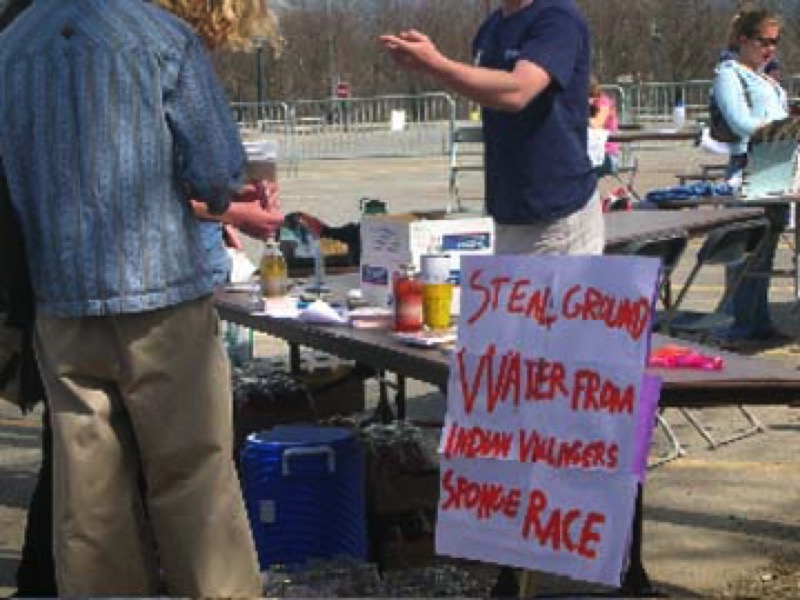
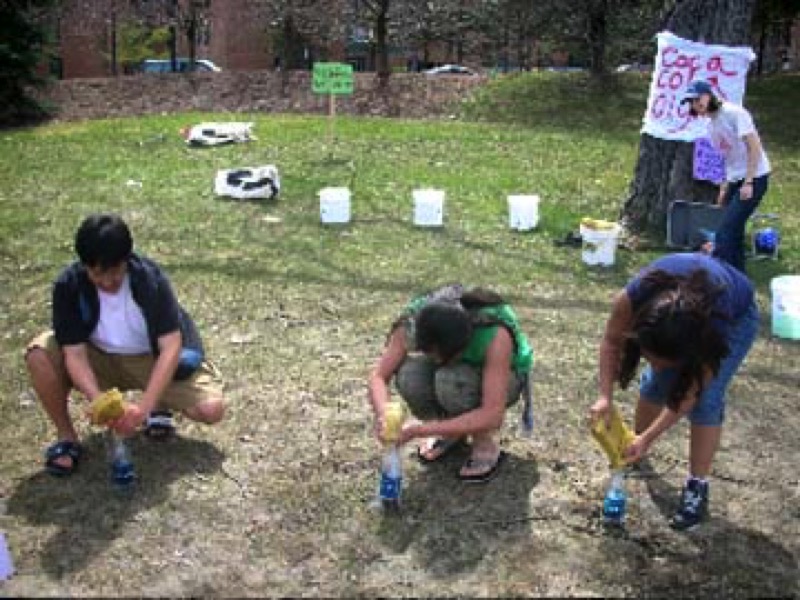
Contaminate Coca-Cola with Pesticides Rock Toss which had people throw rocks or "heavy metals and lead" into Coke products, similar to ring toss.
Chased by the Paramilitary Potato Sack Race which had participants represent Colombian trade unionists in burlap sacks trying to out run the paramilitaries or they would be shot by water guns.
Pollute the Groundwater Around the Bottling Plant Relay Race which had participants get rid of "toxic waste" from a Coke bottling plant by dumping it into a nearby village's groundwater. We had the participants form groups of two to transport the waste by a cup, but couldn't hold the cup so they "wouldn't have any traces on their hands."
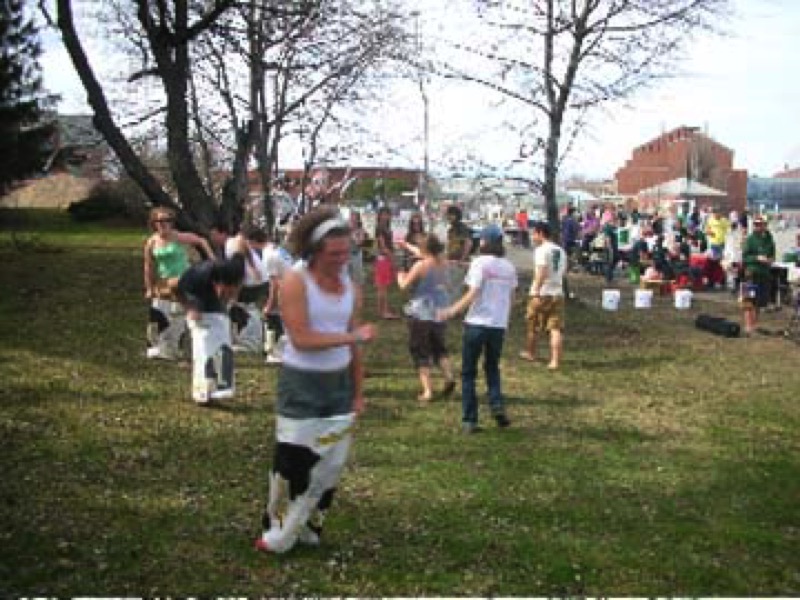

All in all, the event was a big success having many people sign our petition to kick Coke off campus while also providing information about each of these different events. A local drink company named Vtea donated several cases of their product to help us promote a local and healthier alternative to Coke products on campus. Many of these drinks were given away to winners of their events. We even had our university president participate in one of the events!
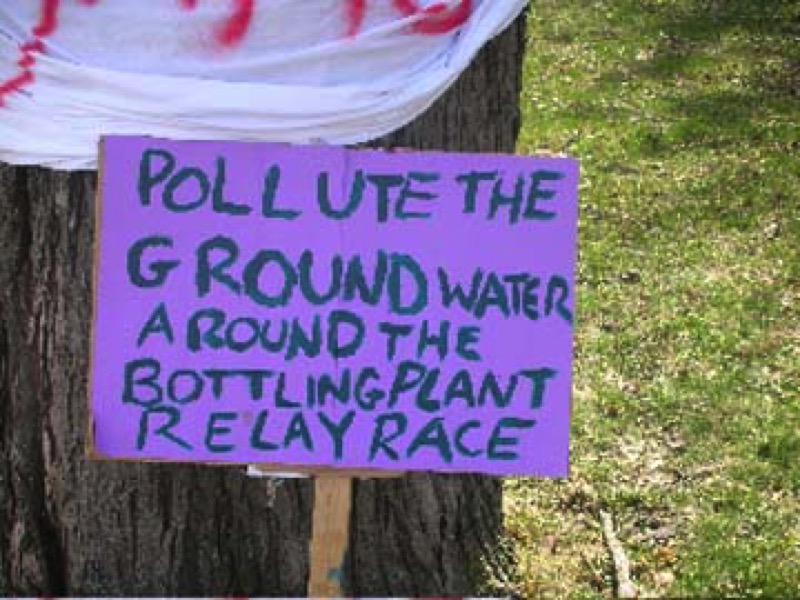
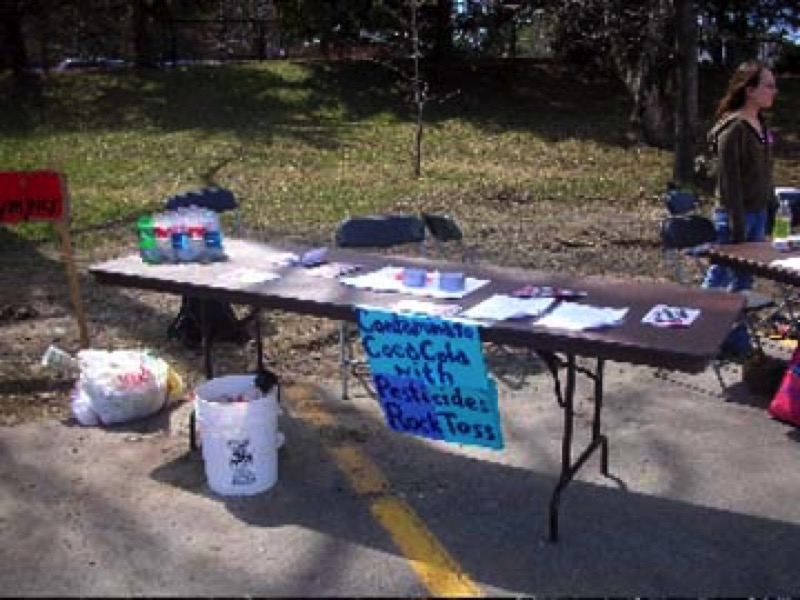
Although our semester is winding down, we received much attention from the event and also recently gave a packet of information to our university president detailing the crimes Coca-Cola has committed. We will be meeting with him to discuss the packet sometime soon. In the meantime enjoy some of the pictures from this event!
The Minnesota Daily, "Bruininks must answer for Coca-Criminals: The University must be a responsible world citizen," By Adri Mehra, 4/26/07
Read Article
"Coca-Cola has proven time and again that it opposes or ignores fair labor practices in Latin America, and many communities near the company's bottling plants in India are experiencing severe water shortages and chemical contaminations of groundwater and soil. It is far past time for University of Minnesota President Robert Bruininks to address these issues with Coca-Cola, as our school has the largest remaining campus contract with the corporation."
l. Chabot College, College of Wooster, Florida International University, Pitzer College, Plymouth State University, University of Minnesota, Williams College
Student groups sponsored Campaign to Stop Killer Coke director Ray Rogers to speak at Plymouth State University (New Hampshire - April 10), Pitzer College (California - April 12) and University of Minnesota (April 23). Each of these campuses have strong core groups waging campaigns to educate their campus communities about Coke's human rights and environmental abuses and to get Coke kicked off their campuses.
Students at College of Wooster (Ohio), Williams College (Massachusetts), Chabot College (California) and Florida International University are raising the level of awareness on their campuses winning allies and preparing to increase the heat on Coke in the Fall.
m. Washington Square News, "Dave Hancock," By Rachel P. Kreiter, May 7, 2007
Read Article
This is a story we picked up about one of the many young people who was so important in making the Campaign to Stop Killer Coke successful at New York University, the largest private university in the United States — Dave is "heading out to California," the article reported, "to become a union organizer. Rock the hell on, Mr. Hancock." We suspect we'll see Dave again in the future.
a. United University Professions (UUP), votes to press campus boycotts and ban Coke at union events
United University Professions (UUP) Delegate Assembly (D.A.), the union's top policymaking body, voted to not serve Coke products at events and to urge UUP chapters to press for the termination of contracts with Coca-Cola on their campuses. The UUP is the union representing more than 32,000 academic and professional faculty on 29 State University of New York campuses, plus System Administration, Empire State College, and the New York State Theatre Institute. UUP is affiliated with the New York State United Teachers and the American Federation of Teachers, AFL-CIO. The resolution below was first passed in April 2007 by the Solidarity Committee of the union and then was passed by the D.A. with no changes.
Read Resolution
b. Colombian Coke truck drivers fired for joining SINALTRAINAL
Sixteen Coke truck drivers were fired for joining SINALTRAINAL. This led to a number of workers chaining themselves in front of a Coca-Cola FEMSA building as a part of a demonstration against the firings. All of these demonstrating workers have put their lives at risk. They are some of the brave, subcontracted, "flexible" workers who make up the vast majority of Coke workers in Colombia.

Coke CEO E. Neville Isdell boasts: "We have solid relationships with organized labor in Colombia." The company and Ed Potter, Coke's Director of Global Labor Relations and Workplace Accountability have repeatedly stated that more than 30 percent of Coca-Cola system workers in Colombia are unionized, in a country where the average for all companies is about four percent...and employs approximately 8,000 people in Colombia. Potter has said in a published article: "In Colombia, the unionization level of our bottlers is over eight times the national unionization rate of four percent."
This is in complete contradiction to what is being reported from Colombia. Coca-Cola considers the vast majority of those 8,000 Coke workers in Colombia to be "flexible" workers employed through various subcontracting schemes, not employees. These workers have no chance of union representation, receive low pay and meager benefits (if any), have no job security and often are mired in poverty. Due to Coke's lobbying efforts in Colombia and the campaign of terror directed at union leaders, only about 4% of Coke's workers in Colombia belong to unions.
c. Teamsters Union Takes on Coke for abuse to workers in U.S. and elsewhere
We reported in our March 26 newsletter that the Teamsters Union has condemned Coke because of worker and human rights abuses in the U.S. and abroad:
"Teamsters rallied today at NCAA Men's Basketball Tournament games in Chicago; Spokane, Washington and Columbus, Ohio to urge the NCAA to drop key sponsor Coca-Cola. The union cited concerns about Coca-Cola's destruction of natural resources in developing countries, its worker and human rights abuses in the U.S. and abroad, and the elimination of good-paying U.S. jobs at Coke bottler and distributor Coca-Cola Enterprises (CCE)."
Since then, there have been additional demonstrations including one in front of a San Diego Padres' game and the Coke annual shareholders meeting. Teamster reps were also present inside the shareholders' meeting where they spoke about Coke's abuse of American Coke workers:
"As investors, you have a right to know that Coke's increasing arrogance with regard to labor, investor and consumer relations may be a very costly mistake," said Dave Laughton, Secretary-Treasurer of the Teamsters Brewery and Soft Drink Workers Conference. "By management refusing to address workers' most basic concerns of job security and affordable health care, Coke may soon precipitate widespread work stoppages with picketlines extended throughout the United States."
PR-Inside.com, "Teamsters Protest Coke Layoffs at Padres Game in Southern California," April 12, 2007
Read Article
d. Jobs with Justice Petition: "Tell Coca-Cola to Stop Worker & Environmental Abuses"
Sign Petition
"Help blow the whistle on environmental, human rights, and labor rights abuses by Coca-Cola and its largest bottler, CCE! Coke is accused of contaminating water and farmland in India. Coke allegedly allowed death squads in Colombia to murder eight pro-union employees. In the U.S., Coke paid $192 million to settle an employee lawsuit over its widespread racial discrimination. And now Coke's latest restructuring could destroy good jobs, retirement security, and health care coverage for many Americans. Please sign the petition..."
3. Report on 2007 Coke Shareholders Meeting
Groups raising issues about Coke were out in force, including Campaign to Stop Killer Coke, USAS, students from Smith College in Massachusetts, Teamsters, India Resource Center, Polaris Institute and Corporate Accountability International, Dozens of us were able to attend the shareholders' meeting with proxies assigned to us from shareholders who support our campaign.
Once again, for the second year, Mr. Isdell allowed only two minutes for shareholders to speak in an effort to stifle dissent and embarrassing questions. Campaign Director Ray Rogers pointed out that at the 2005 meeting speakers had had three minutes to speak. Last year, Isdell, defensively, obnoxiously and incorrectly stated that speakers were always limited to two minutes (See the video proving that Isdell was wrong).
Webcast of 2007 Coca-Cola annual shareholders meeting
Watch Webcast of 2007 Shareholders Meeting
Richard Girard of the Polaris Institute spoke about why Coke was receiving Polaris's Corporate Greenwashing Award:
"On behalf of the Corporate Greenwashing Award Selection Committee, I would like to present The Coca-Cola Company with the first ever corporate Greenwashing Award.
"This award is presented to corporations that have pushed revenue and profits higher while putting millions of dollars into covering up environmentally and socially damaging practices using corporate social responsibility projects.
"There are two reasons why we chose Coke for this year's award:"# 1) Chairman Isdell's performance as the co-chair of this year's World Economic Forum where he effectively polished the company's perceived image as a good corporate citizen.
"At the meeting's opening press conference, Chairman Isdell announced that the company has been reducing water usage by approximately 4 percent annually in order to 'reduce the footprint'.
"The genius of this statement is that nobody really knows how much water Coke and its bottlers are actually using!
"Mr. Isdell's statement, made without citing any evidence, does not hold the company to any kind of reduction quota but helps clean the company's image as a heavy water user.
"Your work at the World Economic Forum is exactly the kind of high profile greenwashing that we are looking for from potential recipients of this award.
"With this kind of PR Coke can become - as they say they want to be - 'best-in-class at water management', without actually doing anything about changing the production process of its bottlers!
"#2) We also want to highlight what the Wall Street Journal calls, Coke's 'clean water kick in the developing world', as another major reason Coke beat out other corporations for this year's award.
"These projects - which are often undertaken in partnership with international institutions - are effective medicine for Coke's PR water headache.
"They give the company very effective ammunition to respond to its critics at events like the AGM, don't hold Coke accountable for its environmentally damaging production process.
"By not actually altering production, growth in revenue is guaranteed meanwhile the company's destructive image is washed away.
"From these two examples we were able to select The Coca-Cola Company as the company that has worked the hardest this year to fool the public that it is an upstanding corporate citizen."
Read Richard Girard's Statement"
The India Resource Center's Amit Srivastava stated: " 'The Coca-Cola Company has finally admitted that it has made mistakes in India but Coca-Cola has not fixed those mistakes. We will continue to increase the pressure on the Coca-Cola company until it is held accountable for the past and present mistakes in India.' "
Unfortunately, Amit's microphone was cut off as was speaking about the TERI assessment being done in India: "The assessment is being carried out by The Energy and Resources Institute (TERI), an Indian organization that is funded by the Coca-Cola India Limited and lists the company as one of its sponsors."
India Resource Center (Press Release in Scoop Independent News), "Coca-Cola Rapped at Shareholders Meeting, April 19,2007
Read Release
Lew Friedman of the Campaign to Stop Killer Coke began speaking about the beating of Ray Rogers at the 2004 shareholders meeting by six Wilmington, Delaware police officers claiming to be security (or security claiming to be police officers). After Rogers was ejected forcibly from the meeting, he spoke to a shareholder. He asked the shareholder: "Doesn't it bother you that you make money from the misery of people around the world?" The shareholder said: "No."
Friedman spoke about the bad reputation the Company and our country has been getting because of "the behavior of corporations such as Coke, Hallliburton, Bechtel, Chiquita, Drummond Coal, Chevron and Blackwater."
"We need," he said, "a company that stands up for social responsibility and corporate responsibility and not simply one that emphasizes the bottom line." He pointed out that in the past, shareholders have consistently voted against proposals that would help Coke clean up its act, including a proposal for an independent investigation of labor abuses in Colombia and motions by B. Wardlaw (whose family, a major founding investor in Coca-Cola, is a large shareholder in Coke) to use the influence of Coke to help end China's human rights abuses. (This year, Mr. Wardlaw's proposal to commission a study and report "on the potential environmental and public health damage of each of its plants, affiliates and proposed ventures extracting water from areas of water scarcity in India" was opposed by Coca-Cola and defeated by shareholders.)
Campaign to Stop Killer Coke Director Ray Rogers focused on Coke's involvement in labor rights violations in Mexico when "job seekers considered too old, too chunky or too dark are screened out by companies...including Coca-Cola, " as well as Coke's negative presence in the Sudan helping to prop up a genocidal government.
The Wall Street Journal (April 18, 2007) reported: "Shareholders rejected five proposals in this year's proxy. The company said 96% of shares voted were cast against a proposal to cap compensation of the company's top five executives to $500,000 a year, plus nominal perks. A proposal for an advisory resolution that would allow shareholders to ratify compensation of top executives was rejected by 69% of shares voted, while 68% of shares voted were cast against a proposal to make restricted stock and performance share units tied to performance...
"Coke also said 93% of shares voted were cast against each of the two remaining proposals. One called for an annual report publicizing the results of chemical and biological testing of the company's drinks. Proponents of the idea said it was necessary after pesticides were detected in Coke drinks in India and after a recall in 2004 of Dasani water in Great Britain when excessive levels of bromate were detected. Coke says it tests its products frequently and its measures are adequate. The other proposal called for a study and report on the "potential environmental and public health damage" of each of the company's plants and ventures that extract water in India."
Articles on the annual meeting:
Associated Press, "Critics Speak at Coke Annual Meeting," By Harry R. Weber, April 18, 2007
Read Article
International Brotherhood of Teamsters (Press Release), "Teamsters Tell Coke Shareholders: Picketlines Next Step: Teamsters Say Mismanagement at Coke Hurting Company, April 19, 2007
Read Press Release
The News Journal, "Protesters greet Coca-Cola execs at meeting: Activists voice concerns, but shareholders focus on bottom line," By Luladey Tadesse, 4/19/07
Read Article
Commondreams.org (Corporate Accountability International), "Questions About Coke's Abuses Still Outnumber Answers at Shareholders' Meeting," April 18, 2007
Read Article
Read reports by Corporate Accountability International
4. White Plains, New York, Beverage Wholesaler Calls for Boycott of Coke products
Independent Media Center, "Westchester County, NY Wholesaler Calls for Boycott of Coca-Cola: The global abuses by Coca-Cola are now being brought to light by local action," By Jason Gooljar, April 16, 2007
Read Article
"Yesterday, I was walking home from White Plains, NY when on Central Avenue [at 351 Central Ave.] I saw something rather interesting. A local beverage wholesaler by the name of the Leewood Beverage Center had signs in their windows that read 'Boycott Coke for Unfair Trade Practices'."
We spoke to a worker at the beverage center who told us that The Coca-Cola Co. was constantly raising the prices of their Coke products while the prices they charge nearby supermarkets were much lower. In fact, we were told: "It would be cheaper for us to buy Coke at the supermarket than from the trucks." The worker further said that her boss would love to drop Coke...
a. "No Coke," Created by Rawane Nassif, Edmonton, Canada
Watch "No Coke' by Rawane Nassif by clicking here.
b. Killer Coke by Chio
Watch "Killer Coke" by Chio by clicking here
6. Someone Should Tell Sen. Hillary Clinton to Stop Promoting Coke's Dasani Water
A report from The New York Times, Tuesday, May 1, 2007:
DRINK
Comparison shopper alert: is Senator Hillary Rodham Clinton the Brand X presidential candidate, and Senator Barack Obama the Brand Y?
Although former President Bill Clinton, for one, does not see much difference between the two when it comes to Iraq, the rivals apparently part ways on drinking preferences.
In the Democratic presidential hopefuls debate on Thursday [April 26], Mrs. Clinton was seen with a bottle of Dasani water, a Coca-Cola product, while Mr. Obama drank Aquafina water, a Pepsi product.
Was this product placement on a political stage?
If so, their campaign contributors might want to take another look at the candidates. Mr. Obama raised more money than Mrs. Clinton from Coke employees ($4,300 versus her $2,300), and Mrs. Clinton took in more from Pepsi people ($4,600 to his $3,050), according to the candidates' campaign finance reports. [Mr. Healy failed to notice the $9,200 contributed to Ms. Clinton by the Philadelphia Coca-Cola Bottling Company.]
By Patrick Healy
A letter was sent to Senator Hillary Rodham Clinton from the Campaign:
The New York Times today (5/1/07) reported that Sen. Clinton was drinking Dasani bottled water during the debate. Perhaps Ms. Clinton is unaware of the worldwide boycott of Coca-Cola products by more than 40 colleges and universities (and a few high schools) as well as some of the largest labor unions in the world.
The Campaign to Stop Killer Coke (www.KillerCoke.org) and its allies have been waging a campaign against The Coca-Cola Co. because of its labor, human rights and environmental abuses. TIAA-CREF, a teachers pension plan, has eliminated Coke from its CREF Social Choice account because it is now considered an irresponsible corporate citizen.
At least one presidential candidate, Dennis Kucinich, signed a campaign petition demanding that Coke end its abuses. This petition with Kucinich's signature can be found online on our site at www.killercoke.org.
In addition, the use of bottled water in plastic bottles is extremely detrimental to the environment. The vast majority of these used bottles find their way into landfill creating a future problem of what to do with our waste and also creates a health hazard in many communities as the toxic parts of the plastic seeps into the water table. Let's not forget that the plastic is made from oil further depleting our oil resources.
Many are beginning to turn to reusable bottles and filling them with tap water (sometimes using filters), often a much safer choice than bottled water. While tap water is regulated by the government, most of the bottled water is not and toxins have often been found present in the bottles.
If Sen. Clinton expects to win the respect of the students at the more than 200 colleges and universities and members of the many labor unions that have been supporting this campaign, I suggest that she end her use of bottled water, especially water sold by Coke.
7. Literary Magazine in Spain Highlights Killer Coke Campaign
Terra Incognita is a Spanish not-for-profit magazine based in Madrid "promoting cultural exchange among the many communities in which English and/or Spanish are spoken." The magazine published a "Campaign to Stop Killer Coke: UPDATE" in its Winter '07 edition focusing on events from December 2005 through August 2006. The update was published in Spanish and in English.
Read Update in English
Read Update in Español
8. Major reports from the campaign that are useful in organizing
Critical Talking Points from the Campaign to Stop Killer Coke
Read the Critical Talking Points on Killer Coke
LABOR AND HUMAN RIGHTS: 'The Real Thing' in Colombia, By Lesley Gill
Read Report
Colombia Solidarity Campaign, "The Anti-Coke Manifesto," By Andy Higginbottom, Secretary, Colombia Solidarity Campaign
Read Manifesto
Read Manifesto in Italian
"Inside the Real Thing: Corporate profile on Coca-Cola Corporation," Report by the Polaris Institute (Canada)
Read the report in pdf format
NYC fact-finding delegation's report on human rights violations by Coke - Final Report, NYC Council Member Hiram Monserrate, April 2004
View Full Report in pdf - html
View Appendices
War on Want, Press Release and Report, "Coca-Cola under fire as World Cup comes to London, Released March 20, 2006
Read Release
Read Report, "Coca-Cola: The Alternative Report" in English
En Español
Seven Points to Settlement
Read the Seven Points.
"ILRF Director Terry Collingsworth Response to Coke's Denials," July 8, 2004
Read Response
"University of Michigan Falls Prey to Another Coca-Cola PR Scam," Campaign to Stop Killer Coke
April 17, 2006 Press Release/Report
WB11, New York Feature on the Campaign to Stop Killer Coke
On July 11, 2005, WB11, one of New York City area's major television stations aired a special "Fact Finders Report" on the Campaign to Stop Killer Coke called "Coca-Cola Faces Human Rights Violations." Interviewed are Campaign Director Ray Rogers, Hofstra University Campaign Activist Vanessa Cudabac, New York City Council Member Hiram Monserrate, New York City Comptroller William Thompson and American Postal Workers Union (APWU) Secretary-Treasurer Terry Stapleton. This excellent feature was watched by millions on WB11 and, as we found out from supporters, watched by others around the world on satellite television.
Play tape of show
The Campaign's Response to Coke's Statements on the WB11 Feature
Read Response
Video, "State of the Union," produced by Insight News for Channel 4 of Great Britain.
Watch State of the Union
9. Do you need a customized Campaign leaflet?
When we invited supporters to contact us to "customize a leaflet for your campus, union or group," the response was terrific! We immediately began getting emails asking us to produce customized leaflets for numerous colleges, universities, high schools and middle schools. We put them up as soon as we could. We have leaflets for Australia, Canada, Colombia (in Spanish), India, Ireland, Japan, the UK and the US.
Because the demand for flyers was so strong, it took up too much server space. We decided to leave the list online with the schools listed for which we have customized flyers. If you need a copy of your flyer, please contact us and we'll email it to you as soon as possible.
Look to see if your customized flyer is listed.
If your school, union or group is not listed and you would like a customized leaflet, please contact us at info@KillerCoke.org. Please state the name of your school and the name of the sponsoring group, if any, and a local email address, if you want us to put them into the flyer. If you want the flyer for a group, please state the name of the group and an email address. Also, whenever you email the Campaign to Stop Killer Coke, please include a phone number, if possible, in case we have a need to talk with you.
10. Campaign's 'Student Activism' Section
Many students interested in launching a Campaign to Stop Killer Coke at their schools and colleges have been contacting us. We recommend that students begin by checking out the two organizing packets in our "Campus Activism" section:
Look to see if your customized flyer is listed.
11. Take Actions Against Coke!
- Call Coca-Cola and tell them to stop their worldwide abuses at 1-800-GET-COKE.
- Sign a Petition protesting Coke's abuses: Sign the Petition
- Join the Boycott at Karmabanque's web site at: www.karmabanque.com
- Send an E-Card to Coca-Cola
12. Please send photos, reports of events, etc. for the Campaign website
Please send photos, reports of events, and if you are in a school, union or organization that has banned Coke products, please send us the resolution or a description of how the decision was made. We would like the Campaign website to be up-to-date and to share the information via our newsletter. (Whenever you email us, please include your phone number and the best times to contact you, including weekends.)
Campaign to Stop KILLER COKE
We are seeking your help to stop a gruesome cycle of murders, kidnappings, and torture of union leaders and organizers involved in daily life-and-death struggles at Coca-Cola bottling plants in Colombia, South America.
"If we lose the fight against Coca-Cola, we will first lose our union, next our jobs and then our lives." SINALTRAINAL VIce President Juan Carlos Galvis
Please donate to the Campaign.
Learn the truth about The Coca-Cola Co.
"We believe the evidence shows that Coca-Cola and its corporate network are rife with immorality, corruption and complicity in murder."
Campaign to Stop Killer Coke/Corporate Campaign, Inc. Director Ray Rogers
Visit www.KillerCoke.org











